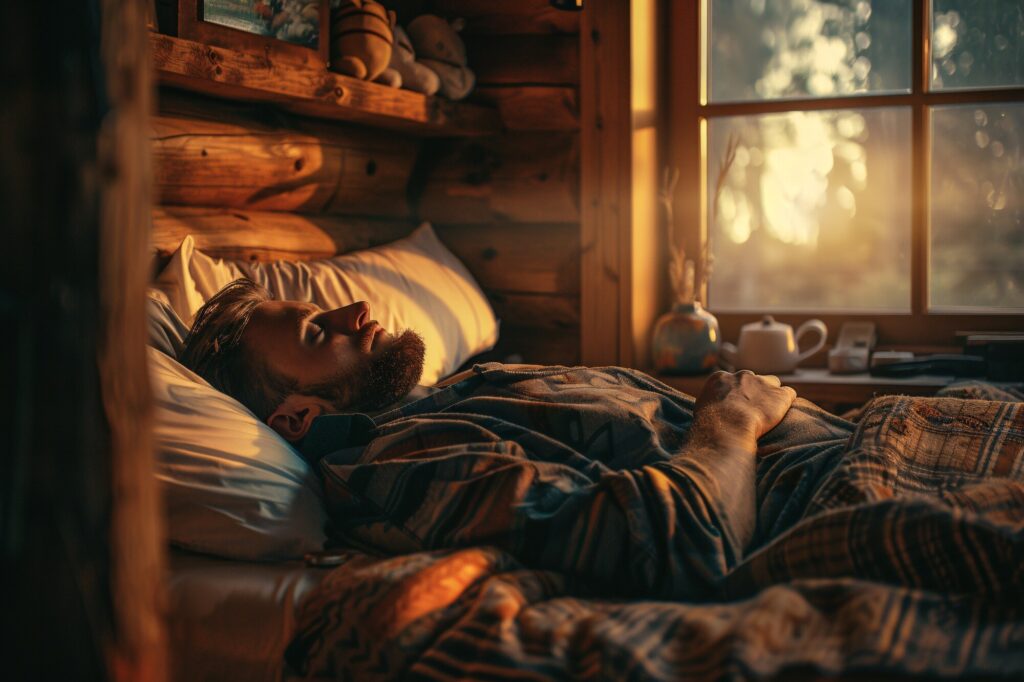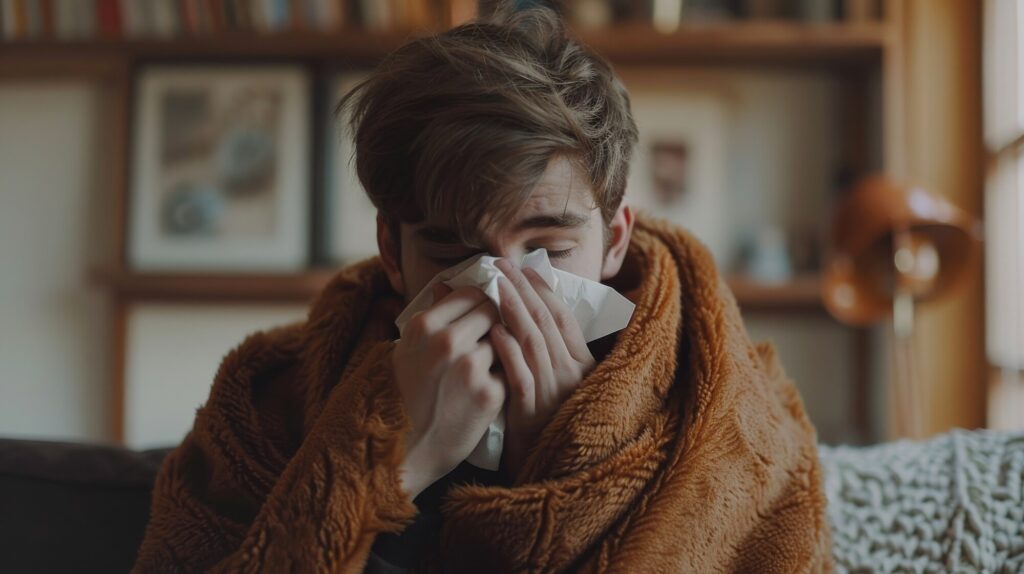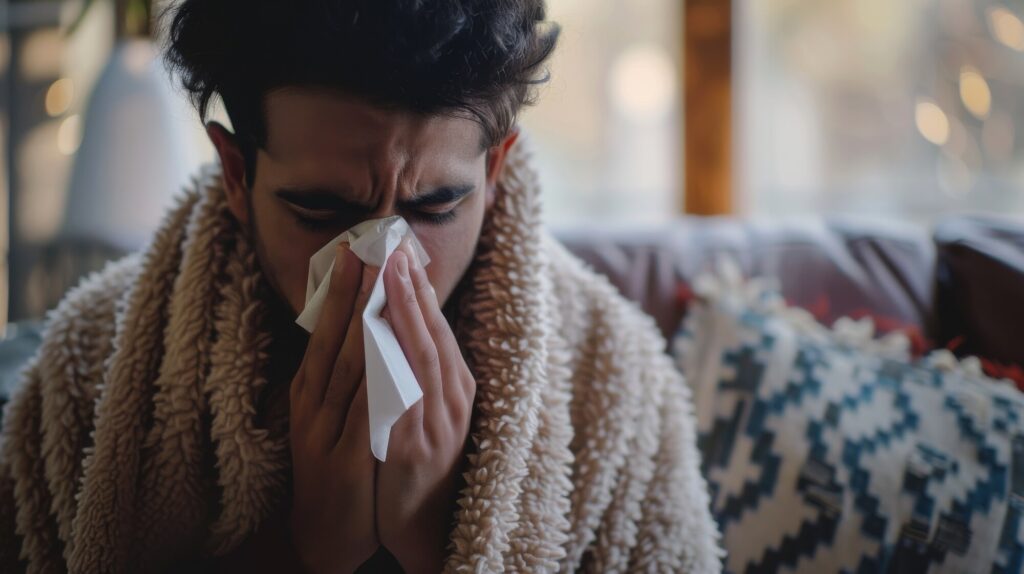
Everyone has experienced the discomfort of trying to sleep in a stuffy, hot environment. It is more difficult to fall asleep, difficult to go deeper into a deep slumber, and impossible to remain comfortable during the night when sleeping in a stifling, scorching room.
If you want to sleep better on hot summer evenings, you might want to think about using a fan rather than air conditioning. A fan, though, might not be the best option, as we think it is. Even though a fan seems straightforward, it cannot offer the comfort we anticipate.
Study: New research indicates that a lower body temperature (preferably between 65 and 68°F, but as low as 60°F) in the bedroom encourages more restorative sleep. [1]
In order to help you have a deeper, more rejuvenating sleep, we’ll go over the main arguments against using a fan to keep cool in bed as well as provide a better alternative.

Is sleeping with a fan bad for you?
A lot of individuals, particularly in warmer climates or during the summer, sleep with a fan on all night long. Still, only a few people are aware of the various health hazards associated with this seemingly innocuous method of staying cool.
Even though the majority of these problems are very small and usually cause more annoyance than harm, they are significant enough to make you reconsider depending on a fan for comfort at night.
1. Heighten Allergies

Because fans move dust, pollen, pet dander, and other allergens in the air, they can exacerbate allergies and respiratory conditions. Allergies may worsen when the fan is switched on because it may release allergens that become lodged in the air filter or fan blades.
Without your knowledge, dust mites and household allergens may accumulate over time on the ceiling fan blades.
This may result in symptoms including congestion, itchy eyes, coughing, and sneezing. It is advised that the fan blades and air filter be routinely cleaned to decrease allergens and lessen typical allergy symptoms.
Did you know that studies have linked seasonal allergies to snoring, poor sleep quality, and sleep disorders? [2]
2. Increase Sinus Irritation

Your fan’s air can dry out your mouth, throat, and nose, irritate your sinuses, and cause your body to generate too much mucus, which can cause congestion and headaches.
In addition, sleeping with a fan might cause sore throats. If you’re allergic, the continual breeze could be uncomfortable for you. The continuous airflow from the fan may exacerbate your symptoms if you are already ill, making you feel worse than before.
Use a humidifier or put a glass of water next to your bed if you plan to use a fan. By doing this, you can lessen the drying effect of the fan and avoid any potential pain.
3. Result in Stiff or Sore Muscles

It’s not uncommon to wake up with sore muscles or a stiff neck, and, strangely enough, using a fan to circulate air while you sleep might actually make your muscles tense. Muscle strain can result from a fan’s nighttime continuous air circulation, particularly in areas that are immediately exposed to the airflow.
If the fan is placed near your face or neck, this issue is more serious. Long-term exposure to a cool breeze can cause the muscles to stiffen up from the steady blast of air, making it difficult to move and causing you to wake up hurting or with a stiff neck.
You can solve this problem by repositioning the fan so that air doesn’t blow straight into your face while you sleep. You might try angling the fan so that air flows around the space without coming into close contact with your body.
4. Cause Dry Skin and Can Irritate Eyes

For people who already have a tendency toward dryness, the constant wind from a desk or ceiling fan at night can cause dry skin and eyes.
The constant airflow from the fan accelerates the evaporation of moisture from the skin and eyes, depriving them of their natural lubricant. As a result, there is uncomfortable dryness, tight or flaky skin, and itchy or inflamed eyes.
The severity of these symptoms may be increased in those with eczema or sensitive eyes. Furthermore, using a fan on a regular basis over time may cause irritation or even more severe eye issues if you wear contact lenses, increasing pain.
When deciding whether to use a fan while you sleep, it’s crucial to take these factors into account, particularly if you already have dry skin or eyes.
5. Increased Congestion

A fan’s airflow can dry up your throat, nose, and mouth, which may cause your body to generate more mucus. This may cause symptoms including headaches, stuffy noses, or even louder snoring.
While using a fan by itself won’t likely get you sick, it can make your current symptoms worse if you’re not feeling well. Congestion may be reduced by drinking plenty of water and using a humidifier in addition to a fan.
6. Potential Noise Disruption
For light sleepers or those who prefer an entirely silent sleeping environment, even a low hum from a fan might cause major disruptions to their sleep.
Even if some fans are made to run softly, they nevertheless provide a steady background noise that is audible in the serenity of the evening. This noise, which can range in volume from a soft buzzing to a loud humming, can disrupt the sleep-wake cycle and cause trouble falling asleep or staying asleep.
This can lead to a reduction in the quality of sleep for those who are sensitive to auditory disruptions because they may experience less deep sleep or more fragmented sleep. Furthermore, it can be difficult for people who are used to sleeping in complete silence to get used to the sound of a fan, which could cause longer-term sleep difficulties.
Did You Know: The Chilipad Dock Pro noise reduces background noise to 41–46 decibels, so you won’t even notice it’s on. Furthermore, regardless of the temperature in your bedroom or the heat your body produces, it is guaranteed to maintain your ideal sleeping temperature, which is between 55 and 115 °F.
7. Interrupted Sleep

Did you know that nighttime air movement might cause you to wake up and worsen sleep disturbances? Thus, the things you use to enhance your sleep can interfere with it.
Fans may exacerbate or cause health problems while providing little help in keeping you cool at night. Using our cooling mattress pad is one way to stay cool at night and fall asleep instead of using a fan.
They are made to keep you cool, comfy, and free from overheating throughout the entire night. Normal mattresses make it hard to stay cool since they retain your body heat and reflect it back towards you.
To avoid overheating and sleeping too hot, hot sleepers can control their body temperature with our cooling mattress pads.
8. Limitations in Temperature Control
It’s critical to recognize a fan’s limitations when it comes to room cooling. A fan only moves air around, even if it may seem as though it is lowering the temperature in the space.
When the air flows over your body, this movement produces a breeze or wind chill effect, which makes you feel colder. But neither the room’s real temperature nor your body’s core temperature are being lowered by the fan.
This distinction becomes more important when the weather is exceptionally hot. A fan only circulates the heated air already present in the room, not removing any of the heat, hence, it is useless if the ambient air temperature is already high. This suggests that even while the breeze may provide you with some short-term respite, the room’s temperature remains constant overall.
Because they are unable to lower the temperature like an air conditioner can, fans are comparatively useless in hot weather.
How to Sleep Cooler at Night
Although the Chilipad sleep system has already been discussed, there are further options for sleeping in a cooler environment.
- Breathable, cool bedding
- Take a warm shower
- Hydrate before bed
- Use blackout curtain
- and more
Are you looking for additional strategies to keep cool and sleep through the night? Discover practical advice and methods for maintaining your composure at night and enhancing the quality of your sleep by reading our blog.
Final Thought
It’s evident that fans have drawbacks despite being a common way to stay cool and decorate your space. There are a number of negative consequences to sleeping with a fan on, including the ability to aggravate allergies, dry up your skin and eyes, and induce muscular stiffness and sleep disturbances due to noise.
It’s critical to balance these considerations with your unique requirements and sleeping habits. Other solutions that can provide comfort without the drawbacks of a fan include permeable bedding, cooling mattress toppers, and keeping the temperature of the room lower.
To ensure continuous, deep sleep, keep in mind that the perfect sleeping environment strikes a balance between comfort, temperature, and personal choice.